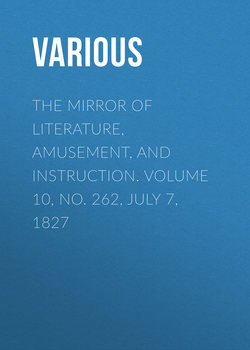Читать книгу The Mirror of Literature, Amusement, and Instruction. Volume 10, No. 262, July 7, 1827 - Various - Страница 1
HIS MAJESTY'S PONEY PHAETON
ОглавлениеWe commence our tenth volume of the MIRROR with an embellishment quite novel in design from the generality of our graphic illustrations, but one which, we flatter ourselves, will excite interest among our friends, especially after so recently, presenting them with a Portrait and Memoir of his Majesty in the Supplement, which last week completed our ninth volume. His Majesty, when residing at his cottage in Windsor Forest, the weather being favourable, seldom allows a day to pass without taking his favourite drive by the Long Walk, and Virginia Water, in his poney phaeton, as represented in the above engraving. Windsor Park being situated on the south side of the town, and 14 miles in circumference, is admirably calculated for the enjoyment of a rural ride. The entrance to the park is by a road called the Long Walk, near three miles in length, through a double plantation of trees on each side, leading to the Ranger's Lodge: on the north east side of the Castle is the Little Park, about four miles in circumference: Queen Elizabeth's Walk herein is much frequented. At the entrance of this park is the Queen's Lodge, a modern erection. This building stands on an easy ascent opposite the upper court, on the south side, and commands a beautiful view of the surrounding country. The gardens are elegant, and have been much enlarged by the addition of the gardens and house of the duke of St. Albans, purchased by his late majesty. The beautiful Cottage Ornée, an engraving of which graces one of our early volumes, is also in the park, and to which place of retirement his present Majesty resorts, and passes much of his time in preference to the bustle and splendour of a royal town life.
Having now given as much description of the engraving as the subject requires, we shall proceed to lay before our readers some further anecdotes connected with the life of his Majesty; for our present purpose, the following interesting article being adapted to our limits, we shall introduce an
Original Letter of his present Majesty, when Prince of Wales, to Alexander Davison, Esq., on the death of Lord Nelson.
I am extremely obliged to you, my dear sir, for your confidential letter, which I received this morning. You may be well assured, that, did it depend upon me, there would not be a wish, a desire of our-ever-to-be-lamented and much-loved friend, as well as adored hero, that I should not consider as a solemn obligation upon his friends and his country to fulfil; it is a duty they owe his memory, and his matchless and unrivalled excellence: such are my sentiments, and I should hope that there is still in this country sufficient honour, virtue, and gratitude to prompt us to ratify and to carry into effect the last dying request of our Nelson, and by that means proving not only to the whole world, but to future ages, that we were worthy of having such a man belonging to us. It must be needless, my dear sir, to discuss over with you in particular the irreparable loss dear Nelson ever must be, not merely to his friends but to his country, especially at the present crisis—and during the present most awful contest, his very name was a host of itself; Nelson and Victory were one and the same to us, and it carried dismay and terror to the hearts of our enemies. But the subject is too painful a one to dwell longer upon; as to myself, all that I can do, either publicly or privately, to testify the reverence, the respect I entertain for his memory as a Hero, and as the greatest public character that ever embellished the page of history, independent of what I can with the greatest truth term, the enthusiastic attachment I felt for him as a friend, I consider it as my duty to fulfil, and therefore, though I may be prevented from taking that ostensible and prominent situation at his funeral which I think my birth and high rank entitled me to claim, still nothing shall prevent me in a private character following his remains to their last resting place; for though the station and the character may be less ostensible, less prominent, yet the feelings of the heart will not therefore be the less poignant, or the less acute.
I am, my dear sir, with the greatest truth,
Ever very sincerely your's,
G. P.1
Brighton, Dec, 18th, 1805.
1
New London Literary Gazette.
